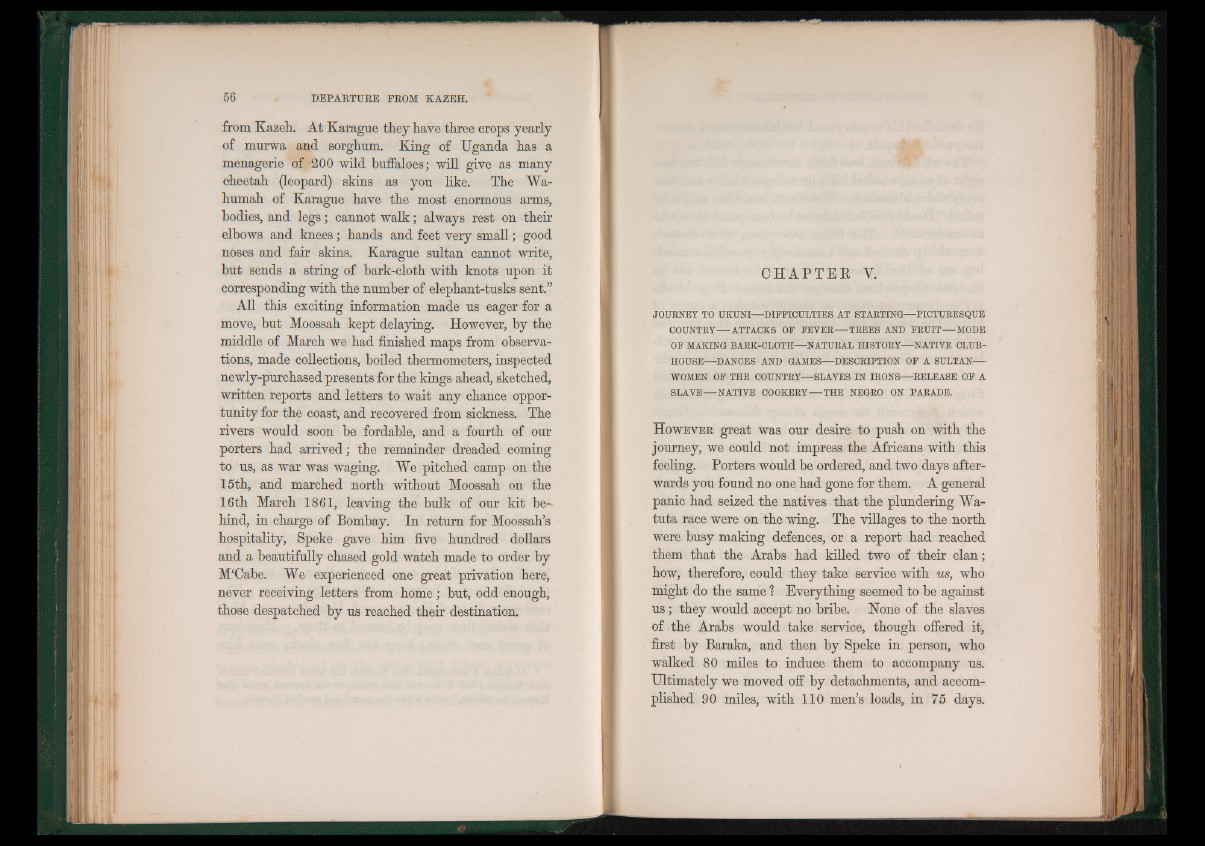
from Kazeh. At Karague they have three crops yearly
of murwa and sorghum. King of Uganda has a
menagerie of 200 wild buffaloes; will give as many
cheetah (leopard) skins as you like. The Wa-
humah of Karague have the most enormous arms,
bodies, and legs; cannot walk; always rest on their
elbows and knees; hands and feet very small; good
noses and fair skins. Karague sultan cannot write,
but sends a string of bark-cloth with knots upon it
corresponding with the number of elephant-tusks sent.”
All this exciting information made us eager for a
move, but Moossah kept delaying. However, by the
middle of March we had finished maps from observations,
made collections, boiled thermometers, inspected
newly-purchased presents for the kings ahead, sketched,
written reports and letters to wait any chance opportunity
for the coast, and recovered from sickness. The
rivers would soon be fordable, and a fourth of our
porters had arrived; the remainder dreaded coming
to us, as war was waging. We pitched camp on the
15th, and marched north without Moossah on the
16th March 1861, leaving the bulk of our kit behind,
in charge of Bombay. In return for Moossah’s
hospitality, Speke gave bim five hundred dollars
and a beautifully chased gold watch made to order by
M'Cabe. We experienced one great privation here,
never receiving letters from home; but, odd enough,
those despatched by us reached their destination.
CH AP T EK m
JOURNEY TO UKUNI— DIFFICULTIES AT STARTING— PICTURESQUE
COUNTRY— ATTACKS OF FEVER— TREES AND FRUIT— MODE
OF MAKING BARK-CLOTH— NATURAL HISTORY— NATIVE CLUBHOUSE—
DANCES AND GAMES— DESCRIPTION OF A SULTAN—
WOMEN OF THE COUNTRY— SLAVES IN IRONS— RELEASE OF A
SLAVE— NATIVE COOKERY— THE NEGRO ON PARADE.
H owever great was our desire to push on with the
journey, we could not impress the Africans with this
feeling. Porters would be ordered, and two days afterwards
you found no one had gone for them. A general
panic had seized the natives that the plundering Wa-
tuta race were on the wing. The villages to the north
were busy making defences, or a report had reached
them that the Arabs had killed two of their clan;
how, therefore, could they take service with us, who
might do the same ? Everything seemed to be against
u s ; they would accept no bribe. None of the slaves
of the Arabs would take service, though offered it,
first by Baraka, and then by Speke in person, who
walked 80 miles to induce them to accompany us.
Ultimately we moved off by detachments, and accomplished
90 miles, with 110 men’s loads, in 75 days.